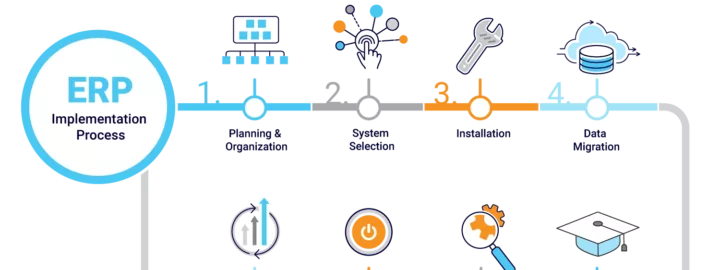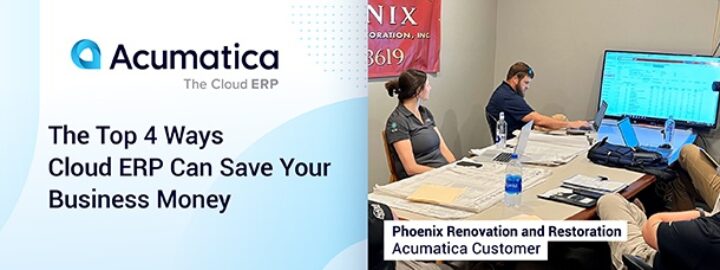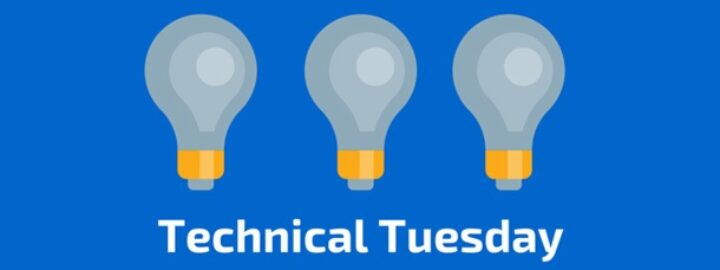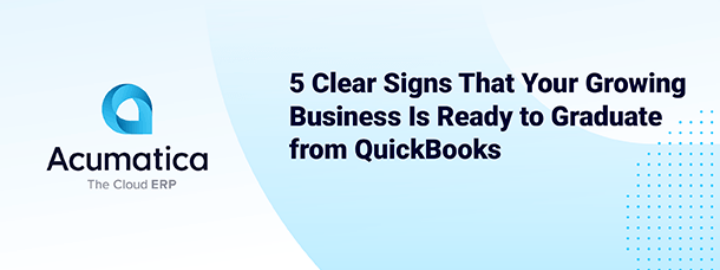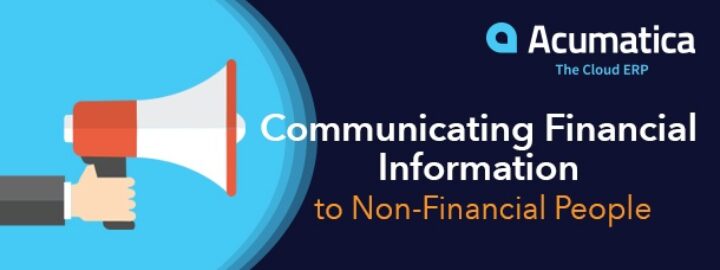Meeting the Needs of Your Accounting Team
Your accounting team is an essential facet of your organization. Tasked with managing your financial health in today’s digital economy, your accounting team members enjoy high-tech tools that help them operate at scale. As technology continues to evolve, further improvements have been made to accounting software in the form of accounting ERP (or accounting software within a cloud ERP solution).
If you’re wondering what the difference is between ERP and accounting software and whether you need to rethink your accounting strategy, then looking at the benefits of—and the differences between—accounting software and ERP will help you determine your next steps.

What is Accounting Software?
Accounting software is an application that allows businesses to handle their accounting transactions, from accounts receivable (AR), accounts payable (AP), and bank management to revenue tracking and financial reporting. It’s a standalone solution with specific functionality, and it does its job well.
Accounting software:
- Eliminates manual data input.
- Improves data accuracy.
- Supplies built-in financial reports.
- Simplifies payroll and tax filing requirements.
- Reduces staff costs.
- Centralizes accounting data for easy access.
It also does more, but the takeaway is that accounting software automates and streamlines your accounting and financial processes while greatly benefiting your accounting team—and your bottom line. With such wonderful benefits, you may wonder, “What’s the difference between ERP and accounting software?”
What is ERP?
An ERP (enterprise resource planning) solution is an end-to-end business management tool that connects multiple departments and applications. Information from finances, sales, marketing, operations, and any third-party application coalesces into the ERP system, making it easy to access business-wide data in real time. The result is a 360° view of the business and real-time access to synchronized data.
An ERP solution contains all the basic accounting functionality found in accounting software, but the ERP system takes that functionality a step further. For example, if your business is in the manufacturing, distribution, or commerce industries, then you’re dealing with supply chain logistics, inventory tracking, warehouse management, and more. The ERP solution will help you cover those evolving needs with advanced financial management capabilities (e.g., using accounting data for planning, investing, and compliance processes) and industry-specific modules. Basic accounting software does not provide those functions.
Let’s look at QuickBooks as an example. Unlike a full-featured ERP system, QuickBooks is entry-level accounting software that doesn’t provide automated communication with customers, doesn’t offer sophisticated reporting (and dashboards), and doesn’t scale with growing companies. It’s sufficient for start-ups and smaller businesses—until they’re ready to take their success to the next level.
Evaluating ERP vs. Accounting Software: Choosing the Right Solution
The differences between ERP and accounting software are clear. Accounting software is a solid, affordable option for smaller organizations with simple accounting needs. Implementing most accounting software, like QuickBooks, is fairly straightforward, requiring several weeks to convert files and configure it to a business’s specific requirements. An ERP solution, on the other hand, is a more sophisticated system that businesses of all sizes can use. It requires a hand-picked team to implement over a longer time period, and the cost varies from system to system.
It’s up to you and your accounting team to determine whether it’s time to upgrade to a comprehensive business management tool or to stay with accounting software that does its job but little else.
If you agree that an accounting ERP system would benefit your business, then the next step is to find the solution that is best for you and your unique needs. There are plenty of ERP solutions to choose from, and you’re going to want to do thorough ERP research and ERP evaluation, answering questions like:
- Does this ERP software provide the applications my company needs?
- Can I tailor it to my business?
- Can I seamlessly integrate it with third-party applications?
- Is customer relationship management (CRM) built into the solution?
- Does the ERP system provide reporting and analytics functionalities that will serve my business today and in the future?
You’ll also want to find out how the ERP solution is deployed. Does the ERP vendor give you the option to choose where your software is hosted? Can it be hosted in the cloud, on your own premises, or through a hybrid approach? Hosting the solution on-premises requires an initial investment in hardware, which is then installed in your building. Your IT staff will be responsible for updates, upgrades, and security. Cloud-based solutions require no on-premises hardware, meaning the ERP vendor is responsible for updates, upgrades, and security. Hybrid options give you a cloud-based solution in a private environment.
Before choosing a system, carefully evaluate your accounting ERP options to increase the chances of a successful implementation.

Choosing the right accounting solution for your business
Comparing ERP and accounting software helps you choose the best option for your needs. Understanding the differences between them is key.
This was the case for Fidelux Lighting.
A women-led and minority-owned company, Fidelux Lighting designs and distributes top-tier LED lighting solutions for commercial customers. The team was using QuickBooks, but tracking/paying commissions, managing their inventory, and handling their accounting was too much for the simple solution to handle. The software also limited their ability to track inventory; it wasn’t customizable; and it did not allow integrations with other software. So, the company found a solution that could do all of these functions and more: Acumatica.
Says Director of Operations Shivani Raval, “As we move into new markets, Acumatica gives us the confidence that we can handle the transactions and growth with ease for many years.”
As Fidelux Lighting’s experience highlights, the right comprehensive cloud ERP solution can help you manage your accounting and financial needs, providing additional industry-specific modules as well as 24/7 access, so you can work from wherever you are, whenever you need.
If you’re ready to upgrade your basic accounting software, contact our team today.
FAQ
Is ERP the same as accounting software?
Most ERP systems and accounting software supply businesses with built-in financial reports and help users eliminate manual data input, improve data accuracy, simplify payroll and tax filing requirements, reduce staff costs, and centralize accounting data for easy access. An ERP solution takes this a step further with additional features and functionality, enabling businesses to gather and store all data from every department in one solution, which offers a complete view of the business’s financial and organizational health.
Are there industry-specific preferences when choosing between ERP and accounting software?
Businesses in every industry can use either basic accounting software or an ERP solution. When trying to decide which one may offer more benefits, it’s crucial to research what each option has to offer. For example, many ERP solutions provide basic and complex accounting capabilities alongside industry-specific applications tailored to a sector’s specialized needs. Many accounting software options only provide basic accounting features and may require customization or additional applications for industry-specific functionality.
What are the long-term limitations/opportunities regarding ERP vs accounting software?
Simple accounting software solutions handle accounting processes. They are typically used by smaller businesses that are just getting started, but, as these businesses grow, they recognize that managing operations beyond financials requires a complete ERP solution. Most ERP solutions are built to manage varying business requirements, including manufacturing, distribution, construction, retail, and more. When it comes to long-term limitations, basic accounting solutions can only take businesses so far, but with the right ERP solution, long-term opportunities for growth and future success are abundant.
 Canada (English)
Canada (English)
 Colombia
Colombia
 Caribbean and Puerto Rico
Caribbean and Puerto Rico
 Ecuador
Ecuador
 India
India
 Indonesia
Indonesia
 Ireland
Ireland
 Malaysia
Malaysia
 Mexico
Mexico
 Panama
Panama
 Peru
Peru
 Philippines
Philippines
 Singapore
Singapore
 South Africa
South Africa
 Sri Lanka
Sri Lanka
 Thailand
Thailand
 United Kingdom
United Kingdom
 United States
United States

